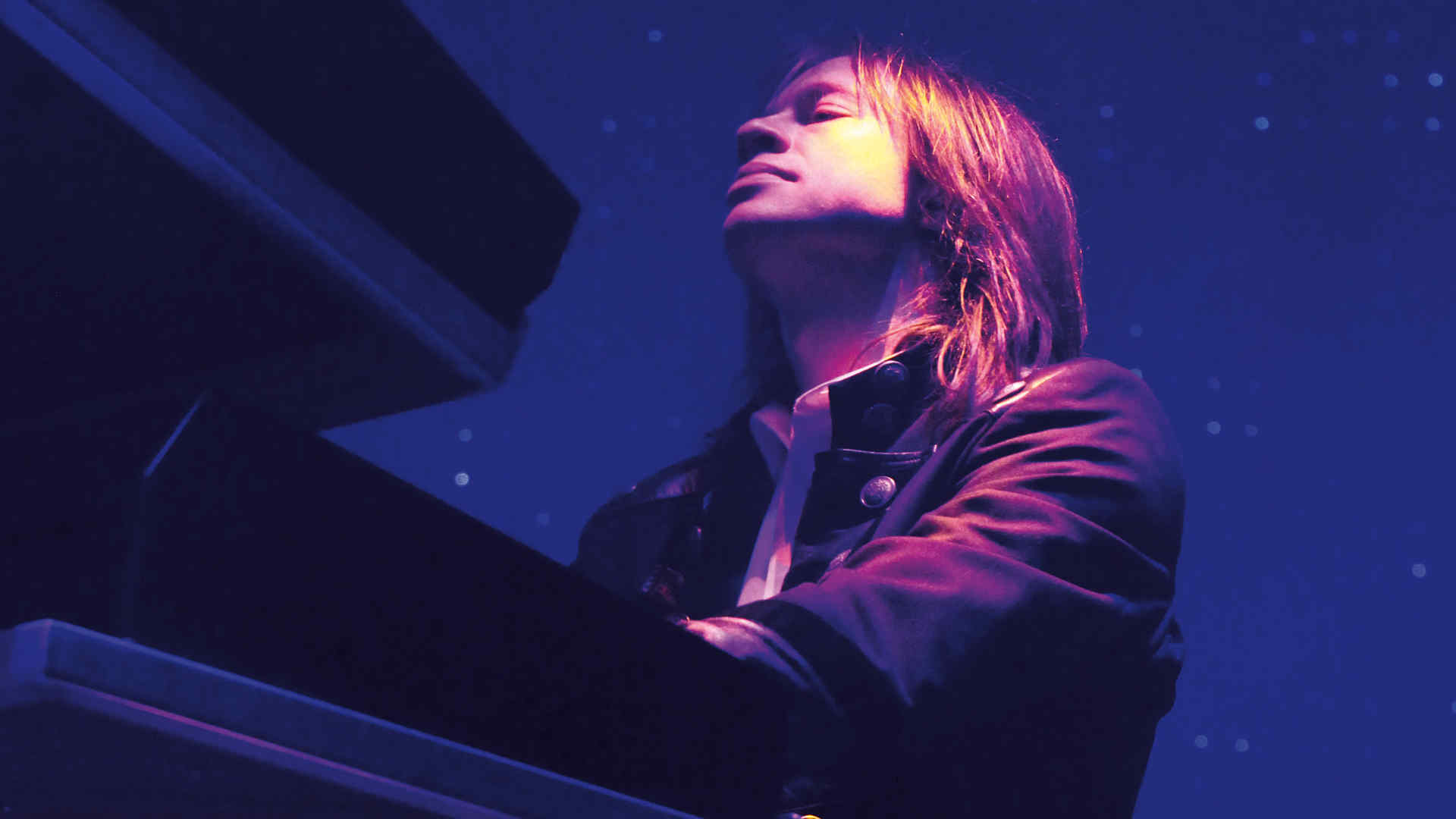
Derek Wieland (Pre-College ’88; BM ’92, MM ’94, piano) traded in his tux and tails for pyrotechnics, smog, and lasers more than a decade ago. The rock and roller hit the road again in November, entering his 12th year touring and his eighth as musical director of the Trans-Siberian Orchestra, or TSO. The progressive rock band, with which Wieland also plays keyboards on stage, may be best known for the original holiday rock operas it brings to sold-out arenas around the United States each winter. Especially recognizable is its heavy-metal realization of “Carol of the Bells,” which is part of their instrumental medley Christmas Eve/Sarajevo 12/24, indispensable in the 24-hour format holiday music lineups that radio stations seem to begin broadcasting earlier and earlier each season.
Growing up in Long Island, Wieland began to play piano at 5 years old and entered Juilliard Pre-College at 11. He earned his bachelor’s and master’s here while studying with György Sándor. As a concert pianist, Wieland performed at Alice Tully Hall and with the Cleveland Orchestra and in 1987, he was the first pianist to win the Seventeen magazine/General Motors Concerto Competition (violinist Joshua Bell had won five years earlier). “I really started out with a classical foundation to my training,” he told the Journal in an interview, noting that during his teenage years, his interests began to diversify. “When I got to Juilliard as an undergrad, I branched out a lot. Through the placement office [now known as the Marks Center for Career Services and Entrepreneurship], I was putting together jazz and rock gigs, and I accompanied a baroque dance class for the dance department.”
Wieland also took an electronic music class and while recording at school met recording department director Robert Taibbi, who became a mentor and advised him as he laid the groundwork to open Uptime Studios, a recording studio in midtown that he built and ran while working on his master’s—and for 10 years following that. “The studio enabled me to get involved with producing classical, jazz, and rock; recording’—and learning a lot about music technology,” he said. “Working in the studio and getting involved in music production and that kind of entrepreneurial activity was very exciting.” And it put him in touch with the individuals who gave him the connections that led to Robert Kinkel, one of the TSO’s co-creators and co-producers, with whom he began playing and who eventually invited Wieland to tour with the band.
“I play keyboards in the recordings and in the show, but to be able to music direct the string parts and the vocals and a lot of the complexity of the things behind it is second nature coming from Juilliard.”
Each year, prior to the band’s winter tour, the group meets for a two-week production rehearsal. In a hangar-sized building in Council Bluffs, Iowa, they get to work coordinating and fine-tuning the synchronicity between the music and accompanying video, light show, lasers, and, of course, pyrotechnics. It takes the combined effort of 40 performers, 36 trucks, and 26 tour buses to pull off the tour, which includes about 120 shows for a combined audience of about a million during six weeks each year.
As the group’s musical director, Wieland performs keyboards on stage in the live show and is responsible for arrangements and other musical matters concerning the instrumentalists and singers. He also collaborates with the show’s sound engineers, where he finds himself drawing on skills from his recording background. “Working with the technology in my studio was crucial in being able to see all the software being used for audio and video and understand how to creatively think of something and to achieve that.”
During the tour itself, Wieland said, “I’m so razor-focused for 14—even 16—hours a day for the eight weeks that the tour is happening. It’s so tense.” Still he laments the dearth of acoustic keyboards on the road. To stay sane, he plays Bach in his limited spare time—“something that works very well on the electric. ” He also writes and composes; he’s working on a rock opera of his own at the moment. When he’s not on the road, Wieland spends time in the recording studio (though Uptime has long since closed) working with TSO, and also singing and producing his own projects. He considers electric bass his second instrument and also plays guitar.
Discussing TSO’s music, which finds its roots in Emerson, Lake & Palmer, The Who, and Pink Floyd, Wieland commented on “the level of technique and the counterpoint integrated with rock, blues, and metal—there’s a lot of fusion.” And there’s fusion of another sort as well, he says. “I play keyboards in the recordings and in the show, but to be able to music direct the string parts and the vocals and a lot of the complexity of the things behind it is second nature coming from Juilliard.”
Wieland considers Sándor, with whom he continued to study piano until the Hungarian pianist died, in 2005, one of the biggest influences in his musical life. Noting that they’d traveled together to Europe for festivals and concerts six times, Wieland said, “he spoke several languages, he had a huge repertoire, and performed and judged all over the world,” adding that his teacher’s “global perspective” gave him encouragement to explore his varied interests. Albeit in a different genre, Wieland has his own global perspective now as TSO has toured to Canada and Europe in the spring three times. The holiday tour stops at the Prudential Center in Newark for two shows on December 26.
Joshua Simka (BM ’14, voice) is the Journal’s assistant editor
Read more stories about the astonishing variety of experiences Juilliard alumni pursue